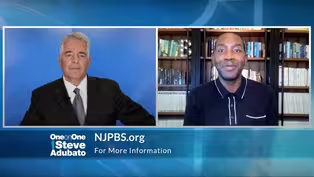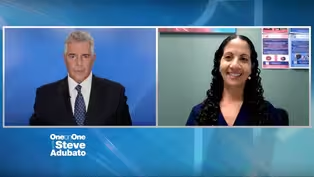One-on-One
Supporting the Needs of Students in Marginalized Communities
Clip: Season 2023 Episode 2635 | 8m 24sVideo has Closed Captions
Supporting the Needs of Students in Marginalized Communities
Michael Salvatore, Ph.D., Senior Vice President of Administration at Kean University and Co-Host of the podcast “Urban Impact,” joins Steve Adubato to discuss his passion for urban research and supporting the academic needs of students from marginalized communities.
Problems playing video? | Closed Captioning Feedback
Problems playing video? | Closed Captioning Feedback
One-on-One is a local public television program presented by NJ PBS
One-on-One
Supporting the Needs of Students in Marginalized Communities
Clip: Season 2023 Episode 2635 | 8m 24sVideo has Closed Captions
Michael Salvatore, Ph.D., Senior Vice President of Administration at Kean University and Co-Host of the podcast “Urban Impact,” joins Steve Adubato to discuss his passion for urban research and supporting the academic needs of students from marginalized communities.
Problems playing video? | Closed Captioning Feedback
How to Watch One-on-One
One-on-One is available to stream on pbs.org and the free PBS App, available on iPhone, Apple TV, Android TV, Android smartphones, Amazon Fire TV, Amazon Fire Tablet, Roku, Samsung Smart TV, and Vizio.
Providing Support for PBS.org
Learn Moreabout PBS online sponsorship(upbeat music) - We now welcome Dr. Michael Salvatore, Senior Vice President of the Administration at Kean University, one of our higher education partners, and co-hosts of the podcast, "Urban Impact", produced by Kean.
Hey, good to see you, Michael.
- Good to see you.
Happy to be here!
- You got it.
Listen, we'll put up the website for the university.
This is part of our series called, "Urban Matters", we're doing in cooperation with Kean University and other supporters of that initiative.
But what is "Urban Impact", that podcast?
- So "Urban Impact" is kind of the brainchild of our president, Dr. Lamont Repollet.
And I actually think it started during COVID, when people were exploring different forms of media.
And he said, "What about the listeners out there?
How are they gonna know, you know?
Let's, why don't we take advantage of our radio show?"
And somewhere along that concept, some, I think people were like, "Do we really wanna do radio?"
You know, "Who's gonna listen to this?"
And we eventually steered to a path of a podcast, which is, as you know, are uber popular.
So we said, "Well, what are we gonna talk about?
You know, this is not gonna be just a music thing.
What is it gonna be?"
And he said, "I think it needs to be around our research agenda."
I mean, we've been talking about urban research.
We're getting the designation at that point- - Hold on, back up.
- Sure.
- Do us a favor, Dr. Salvatore.
Put in perspective the designation about urban research for Kean, please.
- Sure.
So when the president came in, one of the pillars, the things that he wanted to achieve, was to set a research agenda.
But in order to do that, he also wanted to aggressively pursue an R2 Carnegie designation, which meant you had to have legislative support, which also meant that we applied to be, well, we worked with legislators to gain the designation as an urban research university in New Jersey, actually, the first and only urban research university in New Jersey.
- That's important.
And so the podcast you do in cooperation, your co-host is Barbara George Johnson, and Barbara is a leader at Kean as well.
And I guess, what I heard is Lamont, Dr. Repollet, saw the chemistry between you and the rest is history.
But your connection to urban issues, you have real passion and a personal connection.
Talk about that, Michael.
- Sure, it's where I grew up and spent most of my professional career, all of my professional career, in an urban community.
So I- - Where?
- I grew up in Keansburg, New Jersey, and I work- - 117, off the Parkway.
- Yeah, that's what everybody knows about, the amusement park there, right?
That's about it, they know, right?
So a very urban community.
When I went to college, I went to Monmouth University, which is right next to Long Branch, a city.
I started doing school practicums in the city schools there, and eventually came out of school, got a job there as a preschool special ed teacher, one of the few before early childhood expansion.
I worked, became a principal in Gregory City School there.
I worked to become assistant sup.
and then superintendent for 10 years in that community.
And when we talk about urban issues in education, it's something I've lived for a long time, and I certainly understand the, not just the point of advocacy and providing a voice, but putting things into action, putting those insights into action and making things happen.
- You know, the issue of AI, artificial intelligence, you smile when I say that.
We're starting to do more and more programming in that area to try to understand, first of all, what we're talking about and the impact of it.
Why is AI, artificial intelligence, why is that a particularly important issue as it relates to urban matters?
- Sure, so if you dissect the artificial intelligence, it's only as good as search.
So if you realize that the so-called experts, right, who feed the brain of the internet, if you just realize they're people, and they're people from different countries with different priorities, different backgrounds, and different biases, which are really important to talk about.
So if they're feeding that engine, or that brain, and the artificial intelligence is using that as its primary source, we've gotta be really careful, because it's only as good as the information put in.
And we know there's sayings around that.
I work here in data; I live around the data function at the university.
So we typically say, "garbage in, garbage out," but that's what applies to artificial intelligence.
You, it is intuitive, but it's intuitive based upon the experts that have inputted information and designed the algorithms.
So this was one of my favorite episodes.
It was the last episode we did- - Of the podcast.
- Yes- - Yeah, go ahead, I'm sorry.
- Well, we talked about it, because we talked about it from a science perspective, where our research scientists here were really enthused about its ability to write code and be predictive.
And then we talked about it from a literacy perspective, where we had an English teacher talk about how they're using it in their classroom.
And she was really concerned about the ethics behind the so-called experts.
And that was my concern originally.
Whenever we talk about artificial intelligence, you have this idea of when we were kids, looking at these sci-fi movies and the robots taking over the world.
We've just got to be concerned, who's writing the patterns, the algorithms for the so-called brain of artificial intelligence, so- - But what does it have to do with urban... What does that have to do with urban communities?
- So part of our research is, how is that applied to urban settings?
How are designers in urban communities, how are the economics carried out in urban communities, and how are they using these tools to be predictive, or even prescriptive in their approach?
I mean, we are only as good as the information we put in.
So when we're talking about its relativity to urbanization, it's gonna be all connected.
I don't foresee an industry that's not tapping into artificial intelligence.
And what we know is we have, through research, we know that we have to kind of dissect our urban communities and what tools they're using to advance society to provide an education.
And my experience in my other seat prior to coming to Kean University, the tools we were using in urban communities were becoming more predictive and prescriptive than ever before.
You used to have a digital worksheet, that was something fun to use at the turn of the century.
But now, they are measuring your progress each step of the way.
So artificial intelligence is already part of education.
And we've got to be mindful of those inputs and outputs.
- One of the many topics that's explored on "Urban Impact", the podcast produced by Kean University, Dr. Michael Salvatore and the folks at Kean University, our higher ed partner.
I want to thank you so much.
We appreciate it, doctor.
- Thank you.
- I'm Steve Adubato, thanks for watching.
We'll see you next time.
- [Narrator] One-On-One with Steve Adubato has been a production of the Caucus Educational Corporation.
Funding has been provided by Delta Dental of New Jersey.
The Healthcare Foundation of New Jersey.
RWJBarnabas Health.
NJM Insurance Group.
PSEG Foundation.
The New Jersey Education Association.
New Jersey Sharing Network.
Prudential Financial.
And by Robert Wood Johnson Foundation.
Promotional support provided by BestofNJ.com.
And by ROI-NJ.
Hey, kids, PBS Kids and Delta Dental want you to have a healthy smile.
So here are some tips for you to remember.
Number one, eat plenty of crunchy fruits and vegetables.
Number two, brush your teeth after eating sugary snacks or drinking sodas.
And number three, drink lots of water to wash away food particles.
When your teeth are happy, all of you is happy.
From PBS Kids and Delta Dental.
Have a healthy smile.
Host of Table For All Highlights What to Expect on Season 2
Video has Closed Captions
Clip: S2023 Ep2635 | 9m 15s | Host of Table For All Highlights What to Expect on Season 2 (9m 15s)
The Importance of Oral Care for Overall Health
Video has Closed Captions
Clip: S2023 Ep2635 | 10m 1s | The Importance of Oral Care for Overall Health (10m 1s)
Providing Support for PBS.org
Learn Moreabout PBS online sponsorship
- News and Public Affairs

Top journalists deliver compelling original analysis of the hour's headlines.

- News and Public Affairs

FRONTLINE is investigative journalism that questions, explains and changes our world.












Support for PBS provided by:
One-on-One is a local public television program presented by NJ PBS

